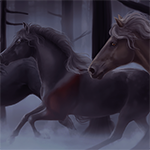08-10-2015, 03:49 PM
this one goes out to you; my little h e a r t w o r m She runs until there is nothing. Perhaps there was always nothing. All the sounds are white noise. She sees Judea, still ready to send her back, to spill the magic back into the earth. She had been so ready. She swears she’d been ready. She sees Eve, sees Zebah. They look at her. They did not expect her to survive. No one did. Their lips move like there’s a question there but she can’t say anything. It’s like she’s deaf, like she’s blind. She’s aware of the others. Aware there are questions, accusations. But they wash over her. She only hears static. White noise. The world is ending. She runs, and then she falls. The impact hurts and for a moment she tries to get up and she can’t, hooves scrabbling at the ashy earth. Sound comes back to her like a thunderclap and she hears herself screaming. She wonders how long it’s been going on. She is suddenly aware her throat is raw. That she is swallowing blood. This is the end, she thinks, and she is glad, but then her hooves find purchase on the ground and she is up, running again. The dead chase them until they don’t. She wonders why they stopped. If perhaps they crossed some territorial line. (If so, she fears whatever protects its territory so well that the dead do not cross.) But she doesn’t care. The realization she does not fear death comes as she stands on aching legs, sides heaving like knives are being stabbed in her lungs. She tells them what happened, Eve and Zebah. They’re our loved ones, she says. Were, she amends. It is the first time she is grateful Iris exists in dreams and nowhere else, so that she doesn’t have to see the flesh rot. (She would have fed every last piece of herself to Iris, if she thought it would have saved her.) The new life begins. It is somehow worse than the mountain. There is no food. It’s her land repeating itself, she realizes. She is grateful she doesn’t have to watch Iris die again. Only my friends, she thinks, then, maybe I’ll die first. She loses weight. The skin is drawn so tight that when nighttime comes, when she changes to a skeleton, you can barely tell the difference. (When her organs tumble out of her stomach, when she survives her nightly vivisection, some of the others try to eat them, bloody mouthfuls of her offal. They fall sick, herbivore bodies unable to process her. She tries, too. Tastes her own heart and thinks of the poem: I like it because it is bitter, and because it is my heart. But it is not bitter. It’s almost sweet.) Judea ends her campaign against Heartworm. She’s too weak to talk. Without her, Heartworm is ignored. She is glad for it. One day it starts to rain and they turn their heads upward like beggars. Their mouths open like baby birds, desperate. The rain is acid and burns holes in their tongues. They drink anyway. The acid burns. No one cares. They will all be dead soon. No one says it, but they know. She stays with her friends. There is a glaze is Zebah’s eye that grows worse, something beyond hunger. She should have noticed, but she was dying, too. (She’ll tell herself that, later. That she couldn’t have stopped it anyway.) She sleeps less. Everything is less. There is even less of her. She begins to lose her hair. Her body eats itself from the inside out, a cancer of starvation. One night she dreams of Iris and wakes up crying and her first thought is what a waste of water this is. She should end it and she knows it, should break her own neck before starvation can finish her. But there is no energy to find a cliff. There is no hemlock to eat. She realizes the irony of it – that she is too weak and sick to kill herself – and laughs, a dry, papery sound. There is a noise, a stir of movement. She raises her head (she is laying out, prone. It’s easier, this way. Less weight to support) and sees them. Zebah and Eve. For a moment her dying brain cannot comprehend what’s happening, and then it does. A feast. Zebah has felled Eve, tears into her. He shouldn’t have the energy but he does, he tears her open, rips her throat out, stopping her mid-scream. She struggles to stand. To save Eve. She is too late, of course. She walks numbly to the body, to the black creature feasting on her flesh. “Zebah,” she says, broken, realizing her mistake too late as his eyes lift from his prize and settle onto her. He is upon her, hooves and teeth. Her flesh is torn away. She moves, tries to fight back, to escape, to run – as if there was anywhere to run to – but her body is a dying thing, a broken machine, and it can do little. She lands a blow or two, desperate, wild swings. He lands many more and it hurts to breathe, hurts to exist, and she thinks, I’m coming, Iris. The world shatters beneath them and her first thought is that dying is nothing like she’d imagined. Zebah falls from sight and she wonders if he fell or if she ascended. I am dead, she thinks, but her body breathes on instinct and the pain that radiates from her cracked ribs suggests otherwise. Still, there is darkness everywhere like shadows risen up to reclaim the land. There are lights, though – stars, light years away, and constellations. She can name some of them. Others she cannot. Pick a number, says a voice. She wonders if it’s God. It sounds at once like someone she once knew and like nothing she’s ever imagined. She is silent. She is dead. Or she is in space. Either way it is impossible to talk. Pick a number. But— The stars sear her retinas. The pain howls like a living creature inside of her. I am not supposed to be, she thinks. The sentence should end with alive, but she leaves it. She should not be. She should not. ”Three,” she says. Three, for her family – for Corsair, for Iris, for herself. Three, for her friends, the ones lost. Three, rhymes with free, which is all she wants, whether the freedom comes from a savior or from death itself. |

